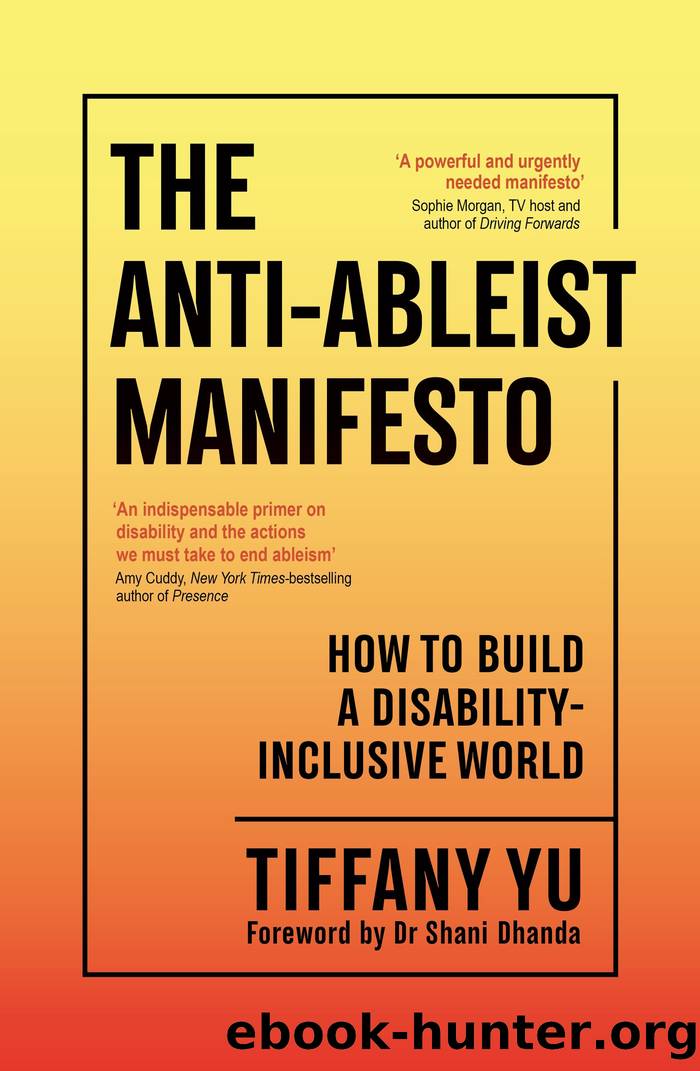The Anti-Ableist Manifesto by Tiffany Yu

Author:Tiffany Yu [Yu, Tiffany]
Language: eng
Format: epub
Publisher: Profile
Published: 2024-09-11T20:00:00+00:00
I believe that the art of asking good questions is a practice that needs to be cultivated over time. Itâs okay to get things wrong or make mistakesâjust donât let your mistakes guilt or shame you into never asking questions again. Try your best to ask good, respectful questions, but donât expect perfection. After all, disabled people have our own preferences. If someone doesnât want to answer your question, respect our boundaries and move on. If someone tells you your question was insensitive, take our feedback and learn from it. One of the best ways to unlearn our assumptions, grow, and tackle ableism together is by continuing to ask those questions and being willing to get things wrong so that we can work together to get things right.9
I often reflect on the fact that even though weâve put out the invitation to others to ask questions, weâre still not having radically honest conversations around disability as a society. I appreciate this sentiment from disability awareness consultant Andrew Gurza: âPlease tell a disabled person if our disability makes you uncomfortable. Honestly, just name it. Kindly. The more we talk about it together, the better equipped weâll be to burn ableism to the ground.â10 You might be thinking, This is super awkward and uncomfortable! Youâre probably right, but we have to start somewhere. When asked how to go about this, Gurza responds, âI often ask people, âDoes my disability make you uneasy?â or âIs my disability an issue for you?â And theyâll tell me, âOh, no, itâs fine.â Only to discover when we really get into what I might need from them that it is uncomfortable.â¦I would ask, âWhy are you uncomfortable?â and âWhere does that discomfort come from?ââ11
Naming the discomfort is a starting point and valuable opportunity to have a more meaningful conversation around disability, where you can reflect on your ableism and learn to be better.12 Yes, hearing that our existence makes someone uncomfortable can hurt our feelings, Gurza says, but knowing that someone feels that way but is staying silent wonât help anyone. There are mixed opinions about this approach, as it puts a greater demand on a disabled personâs emotional labor, but I would love to see more spaces to explore discomfort in a way that doesnât shame people.13
We canât address the problem of ableism if no one is talking about it. Here are a few strategies and tips on how to ask better questions:
Ask yourself whether your question is relevant to the current conversation. Is it a natural segue from the other topics, or will it rudely interrupt the conversation? If the person has already raised the topic of disability, that is a good sign that you can continue to talk and express your curiosity. You can also pay close attention to the person youâre speaking to; we might give good contextual clues in our words or behaviors that will tell you whether weâre open to continuing a conversation or changing the topic. Be sensitive, aware, and considerate.
Download
This site does not store any files on its server. We only index and link to content provided by other sites. Please contact the content providers to delete copyright contents if any and email us, we'll remove relevant links or contents immediately.
| Anthropology | Archaeology |
| Philosophy | Politics & Government |
| Social Sciences | Sociology |
| Women's Studies |
Nudge - Improving Decisions about Health, Wealth, and Happiness by Thaler Sunstein(7690)
The Fire Next Time by James Baldwin(5431)
iGen by Jean M. Twenge(5408)
Adulting by Kelly Williams Brown(4565)
The Sports Rules Book by Human Kinetics(4379)
The Hacking of the American Mind by Robert H. Lustig(4375)
The Ethical Slut by Janet W. Hardy(4242)
Captivate by Vanessa Van Edwards(3838)
Mummy Knew by Lisa James(3686)
In a Sunburned Country by Bill Bryson(3536)
The Worm at the Core by Sheldon Solomon(3485)
Ants Among Elephants by Sujatha Gidla(3460)
The 48 laws of power by Robert Greene & Joost Elffers(3240)
Suicide: A Study in Sociology by Emile Durkheim(3017)
The Slow Fix: Solve Problems, Work Smarter, and Live Better In a World Addicted to Speed by Carl Honore(3006)
The Tipping Point by Malcolm Gladwell(2911)
Humans of New York by Brandon Stanton(2867)
Handbook of Forensic Sociology and Psychology by Stephen J. Morewitz & Mark L. Goldstein(2692)
The Happy Hooker by Xaviera Hollander(2686)
